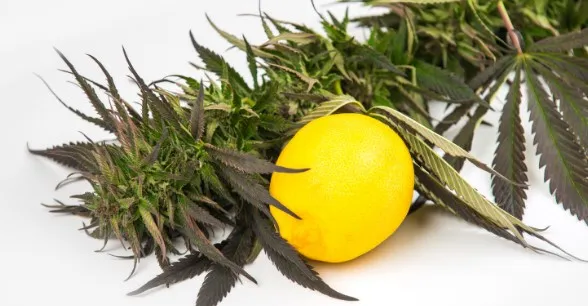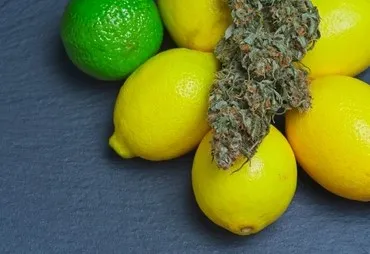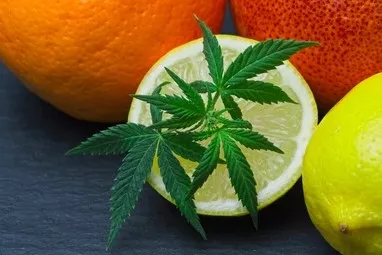The following names are used to identify this terpene: citrus peel terpenes, citral, and linalool. This fragrant chemical can be found in plants (including Cannabis sativa) as well as food stuffs. Limonene is a natural component of pure essential oils from numerous citrus fruits, making it one of the most plentiful terpenes in nature. Limonene is utilized in fragrance formulations, cleaning chemicals, and as a spice ingredient after being extracted from orange fruit nectar. Looking to try something new? Check out this Biscotti Mintz.
Limonene is frequently thought to be abundant in limonene-rich strains, although this isn’t always correct. Look for products that have been lab tested to ensure that the strain contains limonene.
Almost all cannabis strains contain trace amounts of volatile terpenes such as limonene, which account for 10-30% of the dry weight of most blooms.
High-limonene Cannabis Strains
Limonene levels vary considerably across harvests based on genetics, growing methods, and curing techniques, although some have higher amounts than others. The only way to tell whether your strain has a lot of limonene is to purchase lab-tested samples.
Limonene’s Potential Effects and Benefits
Limonene, like other terpenes, has neuroprotective properties and is thus far little understood in terms of how it works in the brain and body. As a result, limonene research to date has utilized huge dosages—many times higher than those found in cannabis—which have produced mixed results. Cannabis-derived limonene requires more study but current data suggest that it holds promise for the following applications:
- Elevated mood
- Stress relief
- Antifungal properties
- Antibacterial properties
- May help relieve heartburn and gastric reflux
- Helps to retain other terpenes and chemicals by way of the skin, mucous membranes, and digestive system.
Limonene has been shown in lab animals to have anti-tumor effects. Limonene slowed the growth of skin and mammary tumors in laboratory mice. These studies were followed by a Phase I human clinical trial, which demonstrated that limonene was somewhat helpful at lowering breast cancer tumor development for almost a year. Later research revealed that daily limonene intake suppressed a protein that stimulates breast cancer tumor development, suggesting that daily limonene usage might inhibit tumor growth and spread.
Limonene has been proven to cause tumor cell death in lung and brain tumours in laboratory studies. Limonene’s actions on breast cancer, on the other hand, necessitate larger doses than those seen with cannabis alone. It’s uncertain whether particular cannabinoids improve limonene’s anti-cancer effects. There isn’t enough evidence right now to suggest that limonene-rich cannabis preparations would help against cancer in people.
Future Research on Limonene
It’s also unclear how limonene works. Inhalation of limonene vapour increases serotonin and dopamine levels in the brain, which are associated with anxiety, sadness, and OCD. Is it merely exciting the olfactory system or does it also have an effect on brain cells? We don’t know yet.
Unlike other terpenes such as linalool and b-caryophyllene, limonene has no known brain receptors. The targets of limonene in the brain and body are unknown, which may hinder users from taking advantage of limonene’s therapeutic properties.
Dosing Considerations for Limonene.
It’s difficult to calculate how much limonene is needed since it depends on a number of factors, such as the user’s age, health, and other things. There isn’t enough scientific understanding right now to establish a limonene dosage range that is safe. Before using any natural therapy, verify the label instructions with your pharmacist or doctor or another healthcare professional.
Supporting Research
Limonene’s chemical stability, on the other hand, makes experimentation difficult. Only a few preclinical studies have been done so far. Limonene is supposed to have anti-inflammatory, antioxidant, and cardioprotective properties.
Israeli researchers conducted an in vitro study in 2006 and discovered that citrus oil may be used as a natural antibacterial and anti-inflammatory medication “in the form of a combination of citrus oil and MgCl2.”
According to a second in vitro study published in the Journal of Oleo Science, limonene inhibits proinflammatory cytokines. Long-term inflammation can be caused by a buildup of proinflammatory cytokines. “ᴅ-Limonene may be considered an anti-inflammatory drug,’” the researchers conclude.
Following reports that it promotes fat accumulation in the liver, Chinese researchers used an animal model of high-fat, diet-induced obesity to investigate limonene. Limonene was found to be “use as a dietary supplement for preventing and treating metabolic diseases.”
The Journal of Experimental and Therapeutic Medicine published a 2018 study in which the effects of ᴅ-limonene on “stroke-prone spontaneously hypertensive rats” (SHRsp) were investigated. Following stroke, ᴅ-limonene was found to lower the “systolic blood pressure in SHRsp rats,” according to the research. It also prevented memory and cognitive decline.
Safety and Side Effects
Limonene is a naturally occurring organic chemical that has been used as a flavor and fragrance component in foods since 1994. When researchers studied it, the chemical’s toxicity was determined to be “slightly low.” Only one reported negative effect was skin irritation caused by limonene-infused shampoos, lotions, or sprays infused with the chemical.
Limonene Cannabis Strains for Anxiety, Depression, and Stress Relief.
Limonene is a terpene that may be found in cannabis and nature. The scent of citrus fruit peels is primarily made up of limonene, therefore you’re correct in assuming that this terpene derives its name from the lemon. Limonene has been used as a fragrance component because to its pleasant aroma for millennia.
Limonene is biodegradable and non-toxic at low dosages. However, greater amounts can result in negative side effects. A gram per kilogram of body weight (about 68 grams of limonene for a 150-pound person) is an excessive amount to ingest. While dietary supplements containing limonene are available, it’s a good idea to talk with your doctor before taking large amounts of limonene on your own since dietary supplements containing limonene are available.
Geranyl pyrophosphate is transformed into limonene by enzymes in the presence of limonene. Limonene may be excreted or converted to other cannabis terpenes after it has been produced.
It’s created by plants to defend themselves against harmful germs, much like many other terpenes. Its antibacterial and antioxidant properties have been well-documented, but it also has an impact on brain function that scientists are attempting to better understand for the treatment of a range of illnesses—including anxiety and other mental health difficulties.
The Potential Benefits of Limonene on Anxiety, Depression, and Stress
Limonene ingestion and limonene vapor were found to decrease anxiety in mice. Limonene was found to aid in the reduction of compulsive obsessive compulsive disorder-like behavior (OCD) in mice, according to research. Limonene’s effectiveness appears to be strain or type of anxiety test used; this implies that its anxiolytic effects may work for some but not others.
Limonene has been shown in animal studies to have antidepressant properties. Limonene’s antidepressant efficacy has not been researched extensively in humans, although one small trial of 12 hospitalised patients with depression found promising results. Limonene vapour inhalation decreased the need for antidepressants in 9 of the patients, reversed stress hormone levels, and boosted immune function, according to one small study.
The ability of limonene to relax anxiety, sadness, and obsessive-compulsive disorder is yet to be fully understood. Limonene vapor inhalation improves anxiety, depressive, and obsessive-compulsive symptoms in the brain via an increase in serotonin and dopamine levels. At this time, it’s unclear how limonene raises these neurotransmitter concentrations. Is it conceivable that limonene simply activates the olfactory system or does it influence brain cells as well? Future studies are needed to see whether there is a combination of both olfactory system activation and cell impact.
Limonene Give Strains a Lemon Aroma
The fragrance of a strain is determined by the interaction of all the terpenes in it. Even if the combination includes numerous terpenes, one Terpene will have a unique scent from many others when combined.
This is something that certain dispensaries, known as “terpene stations,” may offer where you may smell each terpene. nNone of these scents resembles cannabis flower because cannabis contains a wide range of terpenes rather than just one.
It’s conceivable that knowing the name and maybe even smelling a strain’s fragrance may not be sufficient to determine its unique terpene profile. Only lab testing can truly reveal what the terpene content of a cannabis strain or product is.
Unfortunately, most states do not require cannabis products to be tested for terpene levels, and few businesses provide this information on product labels. There are a few cannabis firms that offer terpene profiles to clients via product labels, but finding them may be difficult. Look for lab-tested terpene profiles on the label of any strains recommended by your budtender if you want to know the terpene profile of a strain.



